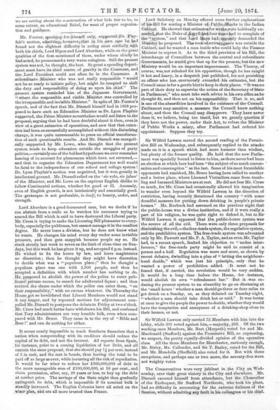Mr. Pointer, apeaki k m for 'himself only, supported 'Dr. Play- fair's
motion, adpritting, -however,..that in his Awn case he had found not the slightest difficulty in acting most cordially with both his chiefs, Lord Ripon and Lord Aberdare, while on the great qualities of the first-mentioned of them, under whom Chiefly he hadacted, he pronounced a very warm eulogium. Still the present system was not, he thought, the best. Sogreat aspending depart- =wit must have its chief centre of gravity in the Commons, and the ,Lord.President could not often, be in ,the Commons. A 'subordinate Alinister who was not really responsible "would not be so ready to initiate policy,, but might be tempted to shift ,the duty -and responsibility of doing so upon his chief." The _ present system reminded him of , the Japanese Government, "6 where the responsible and visible.,Miuister was controlled by the irresponsible and invisible Minister." In spite of ,M.r. Ferster's speech, and of the fact that Mr. Disraeli himself had in 1868 pro- posed to have such an Education Minister as Dr. Lyon Pla.yfair suggested, the Prime Minister-nev,ertheless would ,notliaten to.the propos]; arguing that he had been doubtful about ib then, even in view of a great extension of operations, and- now that that, exten- sion had been so successfully accomplished without this disturbing change, it was quite unreasonable to press an official transforma- tion of such questionable results. And Mr. Disraeli was energeti- cally- supported, by Mr. Lowe, ,who- thought that the present system tends to keep education outside the struggles of party politics,—certainly one of the boldest hypotheses we ever remember hearing of to account for phenomena which have not occurred,— and that to organise the Education Department too well would be fatal to the independence of -our school and college system! Dr. Lyon Playfair's motion was negatived, but it won greatly in intellectual ground. Mr. Disraeli relied on the sic volo, sic jubeo' of the Minister, and Mr. Lowe on the captious Englisla dislike to follow Continental notions, whether for good or ill. Anomaly, even of -English growth, is not intrinsically and essentially good. The grotesque is not preferable, in itself, to beauty, order, and strength.


































 Previous page
Previous page